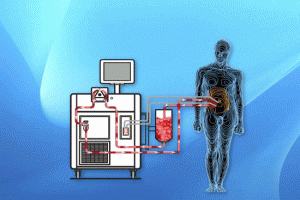Cancer of the colon, ovaries, appendix or other organs within the abdomen often spreads to the lining of the abdominal cavity. Experts call this condition peritoneal surface malignancy. Until recently, treatment options for this form of cancer only provided relief from symptoms.
Emory University Hospital is one of a few facilities nationwide to utilize a new combination therapy to slow or prevent recurrence of this cancer. Hyperthermic intraperitoneal chemoperfusion (HIPEC) is a procedure done immediately following surgery that delivers heated chemotherapy directly into the abdominal cavity where it can penetrate cancerous tissue. Heat at 42 C (107 F) destroys cancer cells and enhances the power of chemotherapy.
The term “intraperitoneal†means that the treatment is delivered to the abdominal cavity. “Hyperthermic chemoperfusion†means that the solution containing chemotherapy is heated to a temperature greater than normal body temperature.
Charles Staley, MD, chief of surgical oncology at the Emory Winship Cancer Institute, says by bathing the abdomen with heated chemotherapy immediately following surgery doctors can administer a higher dose of medication than would normally be tolerated by a patient if given intravenously – the traditional way chemotherapy is administered.
During surgery, Staley removes all visible tumors throughout the abdomen, a procedure known as cytoreductive surgery. Following surgery, while still in the operating room, Staley administers the new treatment, which takes about two hours. Recent studies show improved prognosis in patients treated with HIPEC after the cytoreductive surgery.

Illustration of heated, targeted chemotherapy

